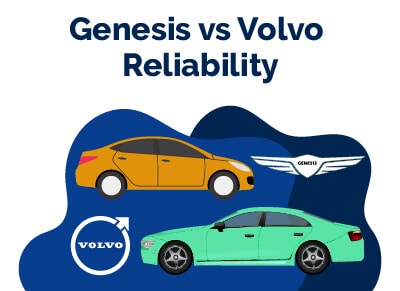Genesis vs Volvo: Which Is More Reliable?
June 7, 2023


Chris is Head of Content for FindTheBestCarPrice and is based out of Philadelphia, PA. As a seasoned automotive industry analyst and car enthusiast, he ensures the highest level of quality across all our content and curates our picks for the best deals each month.
Chris studied information systems and marketing at Drexel University and writes about a wide range of topics ranging from car buying tips to troubleshooting common mechanical issues.
When he’s not thinking about cars, he likes to stay in with his dog and make an “attempt” to finish a crossword puzzle (he’s not quite at the Saturday/Sunday level…yet). As a former cheesemonger, Chris still has a “sharp” passion for all things cheese, and his fridge is always loaded with it!
Chris also has a passion for things that go fast, and drones are no exception. He spends some of his time writing for Dronesourced.
In 2003, Hyundai, a prominent South Korean manufacturer, unveiled its luxury concept vehicle, the first Genesis. The first Genesis model would take four more years to be introduced into the lineup in 2007.
Meanwhile, on April 14th, 1927, the first Volvo car, the ÖV4, drove out of the factory gates in Gothenburg, Sweden.
This open tourer with a four-cylinder engine was the world's first Volvo car and set the stage for the brand's many benefits, including impressive off-road ability, groundbreaking safety features, turbocharged power and economy, elegant Swedish design, and practicality.
Hyundai Genesis is one of the market's most famous full-size luxury sedans. It is often praised for its comfortable ride, sporty looks, luxurious feel, and high-reliability tendencies.
The Volvo Reliability Rating is 3.5 out of 5.0, ranking it 17th out of 32 for all car brands.
Meanwhile, the Hyundai Genesis Reliability Rating is 3.5 out of 5.0, ranking it 7th out of 30 for full-size luxury cars. The article covers all the intricacies of Genesis vs. Volvo reliability.
Table of Contents
- Genesis vs. Volvo Reliability: Detailed Comparison
- Which Is the Best Car: Genesis or Volvo?
- 1. Genesis vs. Volvo Reliability: Design
- 2. Genesis vs. Volvo Reliability: Repair and Maintenance Cost
- 3. Genesis vs. Volvo Reliability: Durability
- 4. Genesis vs. Volvo Reliability: Engine
- 5. Genesis vs. Volvo Reliability: Gas Mileage
- 6. Genesis vs. Volvo Reliability: Technology
- 7. Genesis vs. Volvo Reliability: Safety
- Final Verdict
- Best Car Deals by Category
Genesis vs. Volvo Reliability: Detailed Comparison
| Features | Genesis | Volvo |
| Design | ||
| Repairs and Maintenance Cost | ||
| Durability | ||
| Engine | ||
| Gas Mileage | ||
| Technology | ||
| Safety |
Which Is the Best Car: Genesis or Volvo?
The Genesis has become a favorite full-size luxury sedan, known for providing a comfortable ride, sporty looks, luxurious feel, and high-reliability tendencies.
In contrast, the Swedish automaker Volvo has garnered a loyal following since its first car, the ÖV4, rolled off the assembly line in Gothenburg in 1927.
So, which of these two vehicles reigns supreme? It’s a question with no easy answer, as both brands excel in different areas, from performance and luxury to safety and reliability.
Genesis and Volvo are nearly neck-and-neck when it comes to reliability. Genesis has a reliability rating of 3.5 out of 5.0, placing it 7th out of 30 for full-size luxury cars, and Volvo has a score of 3.5 out of 5.0, ranking it 17th out of 32 for all car brands.
Both brands have proven dependable, ensuring their owners can enjoy their vehicles without worrying about frequent repairs.
1. Genesis vs. Volvo Reliability: Design
With their distinct brand identities, Genesis and Volvo have carved out their respective niches in luxury automobiles. Genesis boasts an athletic elegance that seamlessly balances power and sophistication in a distinctly Korean fashion.
The brand’s design philosophy is exemplified by the perfect harmony of the Athletic and Elegance elements, creating a visually stunning and memorable driving experience.
From the signature crest grille to the iconic parabolic line, every aspect of Genesis’ design is carefully crafted to reflect the brand’s identity and elevate the purity of the overall aesthetic.
Furthermore, the brand’s “Beauty of White Space” approach to interior design creates a sense of spaciousness and calm, complementing the state-of-the-art technology that defines Genesis vehicles.
On the other hand, Volvo’s brand personality centers around competence and reliability, with a laser focus on safety. The brand’s consistent commitment to this value has allowed it to take ownership of the concept of safety, even transcending the automotive industry.
Every Volvo vehicle features premium features, exceptional build quality, and consistently-high safety standards, ensuring that every driver and passenger can enjoy both comfort and peace of mind on the road.
Winner: Genesis
2. Genesis vs. Volvo Reliability: Repair and Maintenance Cost
Regarding service and maintenance costs, the Hyundai Genesis and Volvo are two luxury brands that exhibit differences.
The yearly upkeep expenses for the Hyundai Genesis total a moderate $565. The cost of repairing and maintaining a Genesis vehicle isn’t set in stone.
It may vary depending on the car’s age, mileage, location, and the shop that performs the service. Meanwhile, a Volvo owner should prepare to spend an annual maintenance cost of $769.
Winner: Genesis
3. Genesis vs. Volvo Reliability: Durability
The Hyundai Genesis typically attains a mileage range of 180,000 to 200,000 miles on the odometer, although these numbers are contingent upon meticulous vehicle maintenance.
There have been reported instances where the Genesis has achieved a mileage beyond 200,000 miles.
Conversely, the mileage range for a Volvo varies according to its make and year.
Nevertheless, with the appropriate upkeep, a Volvo’s average lifespan is typically 20 years, with a mileage of over 200,000 miles, which places it ahead of the Hyundai Genesis in terms of longevity. Therefore, the winner in this category is Volvo.
Winner: Volvo
4. Genesis vs. Volvo Reliability: Engine
At the heart of the Genesis 5.0 R-Spec model lies its cutting-edge Tau V8 engine, which delivers an awe-inspiring 429 horsepower at 6,400 rpm and an impressive peak torque of 376 lb. ft. at 5,000 rpm.
The model also has a 4.6-liter V8 configuration and a 3.8-liter V6, each offered in three different equipment setups.
For those seeking a more exhilarating ride, the 3.3L Turbo Gasoline Engine boasts a mid-phase air intake CVVT system and twin-turbo engine, complemented by an integrated exhaust head and electronic thermostat.
Meanwhile, there are three types of Volvo’s gas-only powertrains, namely, T4, T5, and T6. They’re all matched with an impeccably smooth and precise 8-speed automatic transmission.
The Volvo XC40 engine is the turbocharged 2.0-liter four-cylinder T4 engine. It produces a respectable 187 horsepower and 221 pound-feet of torque.
In terms of sheer power and performance, the Genesis 5.0 R-Spec model’s Tau V8 engine outshines the T4 engine of the Volvo XC40, making it the clear winner in this category.
Winner: Genesis
5. Genesis vs. Volvo Reliability: Gas Mileage
The 2021 Genesis G80 claims the title for the most fuel-efficient Genesis model, achieving an impressive 32 highway mpg. However, the 2021 Genesis G70 is not far behind with up to 30 highway mpg.
On the other hand, the 2022 Volvo S60 sedan leads the fuel efficiency race for Volvo with an exceptional 35 highway mpg.
Popular Volvo models like the XC40 SUV and the XC60 and XC90 SUVs offer good fuel efficiency at 32 and 30 highway mpg, respectively.
Winner: Volvo
6. Genesis vs. Volvo Reliability: Technology
Genesis offers a range of advanced features to enhance the driving experience. The BUILT-IN CAM feature enables drivers to remotely monitor the vehicle’s surroundings and status through a smartphone app.
The Genesis Digital Key app provides convenient touch, remote control, and key-sharing capabilities with friends and family.
Wireless smartphone charging is also available, triggering an alert if the driver exits the vehicle with the phone inside.
The Lexicon 15-speaker system with Quantum Logic Surround technology delivers exceptional sound quality, clear projection, rich bass, and an immersive listening experience.
Volvo offers two innovative Sensus touchscreens designed with seamless and user-centric experiences in mind.
One features a portrait display for easier viewing, thumb controls, natural speech voice recognition software, a semi-transparent head-up display, and a 3D imaging navigation system.
Additionally, the Premium Sound Bowers & Wilkins system produces high-quality tones. This Sensus touchscreen comes standard on the XC90, S90, V90, and V90 Cross Country models.
The other Sensus system includes text-to-voice SMS message-reading software, voice control, and three unique display configurations - Performance, Eco, or Elegance. This Sensus touchscreen has an easy-to-use navigation system and a Harman Kardon sound system.
This version of the Sensus touchscreen is equipped with the S60, V60, S60 Cross Country, V60 Cross Country, and XC60 models. The Volvo On Call app is available on your smartphone or smartwatch to assist with various tasks.
The latest On Call feature is digital service booking, allowing you to make your next car service appointment with a touch of a few buttons. This feature shows you service reminders, on-demand scheduling, and price transparency.
Winner: Genesis
7. Genesis vs. Volvo Reliability: Safety
Genesis provides various advanced safety features, such as Lane Keep Assist, that aid in avoiding lane departure, and Smart Cruise Control with Stop/Start, which ensures a safe distance from the vehicle in front.
Furthermore, Blind Spot Detection with Rear Cross-Traffic Alert notifies drivers of potential obstructions during lane changes and incoming vehicles from the rear.
Volvo’s collision avoidance systems utilize intelligent technology to warn and prevent collisions with other vehicles, pedestrians, and cyclists through audible, visible, and brake pulse warnings. In an imminent collision, the vehicle can automatically apply the brakes.
Volvo’s Lane Keeping Aid gently steers the vehicle back into the lane if the driver crosses a lane marking without using the indicator, with vibrations in the steering wheel for added warning.
Run-off road mitigation helps steer the vehicle back onto the road if the outer lane marking is crossed at speeds between 65 km/h and 140 km/h and can activate the brakes to keep the vehicle on the road.
Volvo’s Cross-Traffic Alert with Auto Brake warns approaching vehicles while reversing out of a parking space and can apply the brakes in the case of an impending collision. Blind Spot Information System (BLIS) notifies the driver via a left or right door mirror light.
It steers the vehicle back into the lane when a vehicle enters the blind spot or approaches rapidly in a lane on either side of the car.
Finally, the Surround View Camera, consisting of four high-definition cameras, offers a 360° bird’s eye view of the car’s surroundings for confident entry and exit of confined spaces.
Winner: Volvo
Final Verdict
The Genesis vs. Volvo reliability contest was close, as they were neck and neck in most categories.
Genesis, however, slightly edges past Volvo overall. Both cars offer exciting features, and whatever your choice, you’re unlikely to go wrong with either.
Best Car Deals by Category
Posted in Car Buying Tips, Car Troubleshooting |




